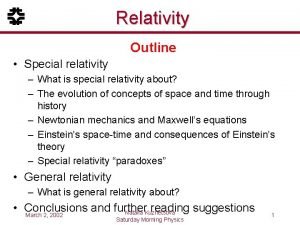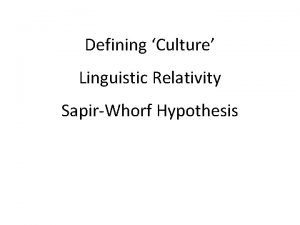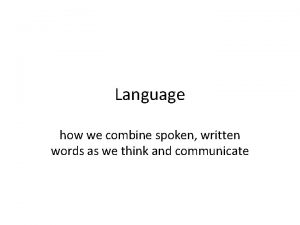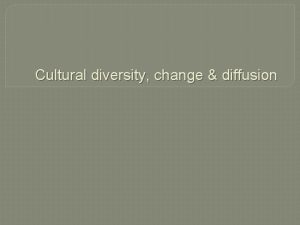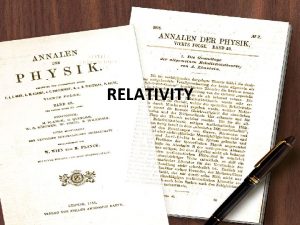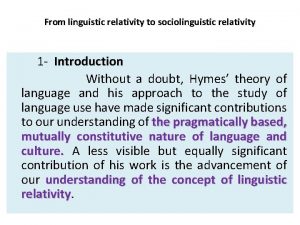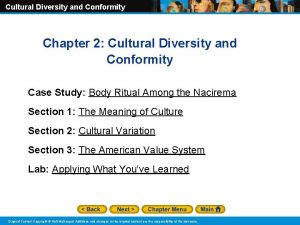Cultural Diversity Language Linguistic Relativity SAPIRWHORFHYPOTHESIS an individuals











- Slides: 11

Cultural Diversity & Language

Linguistic Relativity SAPIR-WHORF-HYPOTHESIS an individual's thoughts and actions are determined by the language or languages that individual speaks; „It is quite an illusion to imagine that one adjusts to reality essentially without the use of language and that language is merely an incidental means of solving specific problems of communication or reflection. The fact of the matter is that the 'real world' is to a large extent unconsciously built upon the language habits of the group. No two languages are ever sufficiently similar to be considered as representing the same social reality. The worlds in which different societies live are distinct worlds, not merely the same world with different labels attached. . . We see and hear and otherwise experience very largely as we do because the language habits of our community predispose certain choices of interpretation. " -Sapir (1958: 69) “The borders of my language are the borders of my world. ” Ludwig Wittgenstein (Die Grenzen meiner Sprache sind die Grenzen meiner Welt. )

Teaching a Foreign Language o LANGUAGE LEARNING: language only o LANGUAGE EDUCATION: language + culture o first comes accuracy, then appropriacy (politeness etc. )

Conceptions of time o Hopi o Piraha: https: //www. youtube. com/watch? v=n. DM 8 G 5 tu. HF 8

Conceptions of deixis o Aborigines tribe: Guugu Yimithirr “The boy is standing east of the house. ”

Conceptions of colours o Our language doesn't force us to see only what it gives us words for, but it can affect how we put things into groups. o In other words, the influence of language isn't so much on what we can think about, or even what we do think about, but rather on how we break up reality into categories and label them.

Politeness o aim: maintenance of „face“ “This standard is based on collective values or norms which have been acquired by individual agents usually earlier in their lives as part of a socialisation process. Those norms or collective values such as the deference shown to elderly people, the physical distance we maintain from other people on order to feel comfortable, etc. have been “programmed” early in our lives and thus determine the individual’s subjective definition of rationality (Hofstede 1984: 18), a definition of rationality which may or may not be shared by different societies. ” (Márquez-Reiter 2000: 2)

Positive PS vs. Negative PS o jokes o questioning o nicknames o hedging o tag questions (“You have been overreacting a little, o presenting disagreement as opinions haven’t you? ”) o in-group jargon and slang o special discourse markers (“please” imperative) variables in degrees of politeness: - the social distance of the speaker and hearer - the relative 'power' of the speaker over the hearer - the absolute ranking of impositions (Zumutungen) in the particular culture

Variables in Degrees of Politeness “The greater the social distance between the interlocutors (e. g. , if they know each other very little), the more politeness is generally expected. The greater the (perceived) relative power of hearer over speaker, the more politeness is recommended. The heavier the imposition made on the hearer (the more of their time required, or the greater the favour requested), the more politeness will generally have to be used. "

Ideologies o Victor Klemperer: „LTI – Tagebuch eines Philologen“ (Lingua Tertii Imperi) o Volks-, ent-, „Säuberung“ etc. „Die LTI ist ganz darauf gerichtet, den einzelnen um sein individuelles Wesen zu bringen, ihn als Persönlichkeit zu betäuben, ihn zum gedanken- und willenlosen Stück einer in bestimmter Richtung getriebenen und gehetzten Herde, ihn zum Atom eines rollenden Steinblocks zu machen. Die LTI ist die Sprache des Massenfanatismus. “

Sources Márquez-Reiter, Rosina (2000): Linguistic politeness in Britain and Uruguay. A contrastive study of requests and apologies. Amsterdam, Philadelphia: John Benjamins Pub. Co (Pragmatics & beyond, new ser. 83). Klemperer, Victor (1987): LTI: Notizbuch eines Philologen. Köln: Röderberg. http: //instruction 2. mtsac. edu/rjagodka/BUSM_51_Project/Negotiating/Thailand. pdf https: //www. linguisticsociety. org/content/does-language-i-speak-influence-way-i-think https: //linguistlist. org/ask-ling/sapir. cfm https: //www. youtube. com/watch? v=USr 5 p. Tu. ZHPY https: //www. youtube. com/watch? v=n. DM 8 G 5 tu. HF 8 https: //www. cambridge. org/core/books/politeness/E 9 FC 00 C 681300 A 3 F 22 F 37 CD 9 AC 565 C 0 F https: //www. thoughtco. com/politeness-strategies-conversation-1691516
 Boost interprocess
Boost interprocess Special relativity vs general relativity
Special relativity vs general relativity General relativity vs special relativity
General relativity vs special relativity Sapir-whorf hypothesis linguistic relativity
Sapir-whorf hypothesis linguistic relativity Sapir whorf hypothesis
Sapir whorf hypothesis Sapir whorf theory
Sapir whorf theory Principle of linguistic relativity
Principle of linguistic relativity Definition of linguistic determinism
Definition of linguistic determinism Linguistic relativity examples
Linguistic relativity examples Linguistic relativity examples
Linguistic relativity examples Sapir whorf hypothesis
Sapir whorf hypothesis Linguistic diversity definition ap human geography
Linguistic diversity definition ap human geography

